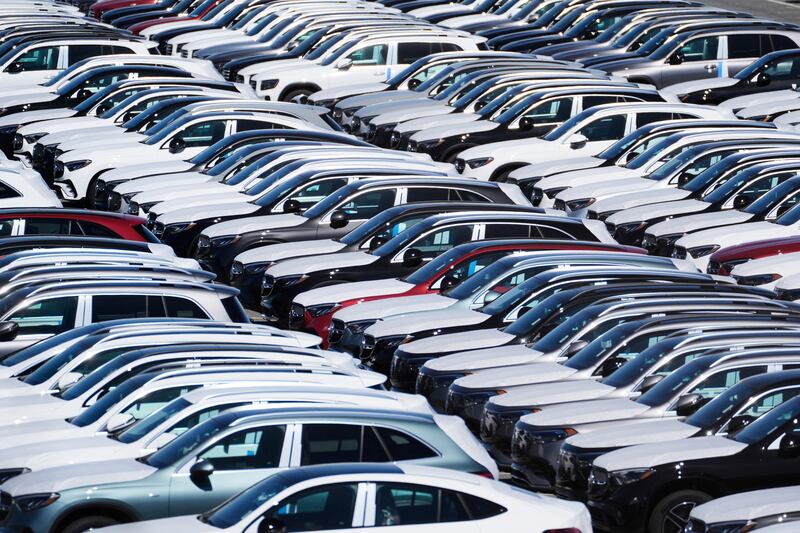- President Donald Trump has announced a 25% tariff on all foreign-made cars.
- Multiple foreign leaders have spoken about introducing retaliatory tariffs.
- Leaders claimed that these tariffs will have a negative effect on the U.S. as well.
President Donald Trump on Wednesday announced a 25% tariff on all foreign made cars. Since the announcement, multiple foreign leaders have spoken out about the tariffs, with some mentioning retaliation.
Trump said the auto tariffs will cause over “over $100 billion in new annual revenue to the U.S.” as previously reported by The Deseret News.
“This is very exciting.” the president said. “This is going to lead to the construction of a lot of plants, in this case auto plants. You’re going to see numbers like you’ve never seen in employment. A lot of people making a lot of cars.”
Reactions from foreign leaders
Canada
Canadian Prime Minister Mark Carney referred to the tariffs as a “direct attack” and a violation of the U.S.-Mexico-Canada agreement, per CNN.
“We will defend our workers, we will defend our companies, we will defend our country, and we will defend it together,” Carney said according to Reuters.
Carney announced that Canada will introduce additional retaliatory tariffs, which will be finalized on April 2.
“It is my solemn promise that when President Trump threatens us again we will fight back,” he said, according to The New York Times.
Mexico
Claudia Sheinbaum, the president of Mexico, said her country would also be offering a response to the tariffs on April 3. She added that her government is working to remove or lower fees on specific Mexican-assembled autos and parts.
Germany
German Chancellor Olaf Scholz released a statement calling Trump’s decision to impose tariffs “wrong.”
Scholz added that the tariffs are the start of the U.S. “embarking on a path that will only end with losers. Because tariffs and isolation cost prosperity for everyone,” according to The New York Times.
The auto tariffs were criticized by others in the German government, saying they will make cars more expensive.
“The announcements of high tariffs on cars and car parts are bad news for German automakers, for the German economy, for the E.U., but also for the U.S.,” Germany’s economy minister, Robert Habeck, said, according to The New York Times.
Japan
Cars made up 28.3% of all exports from Japan in 2024, a country that produces several popular car brands. Japanese Prime Minister Shigeru Ishiba said his government will be considering its options in how to respond to the tariffs, per Reuters.
“We are strongly requesting that this 25% not be applied to Japan,” he added, according to CNN. “Japan invests in the United States, creating jobs and paying the highest wages.”
South Korea
Auto companies are expected to experience considerable difficulties due to the tariffs on cars and auto parts, trade minister Ahn Duk-geun said. Ahn held an emergency response meeting with representatives from automobile companies, industry associations and research institutions to discuss the tariffs.
On Tuesday, Hyundai committed to investing $21 billion in the U.S. over the next three years. The investment would focus on expanding its manufacturing capabilities.
France
Emmanuel Macron, the president of France, spoke at a news conference on Thursday and said he had told Trump earlier this week that the tariffs were “not a good idea.” He added that Europe will be reciprocating with the goal of getting the U.S. to reconsider.
“At a moment when President Trump is asking Europeans to make a bigger military effort to ensure our own security, it’s not the moment to impose tariffs on us — that’s not coherent,” he said according to The New York Times.
Macron also said that the auto tariffs would hurt both sides of the Atlantic.
The United Kingdom
United Kingdom Chancellor Rachel Reeves said the U.K. is not planning immediate retaliatory tariffs on car imports from the U.S, according to The New York Times.
China
This round of tariffs will not have much of an impact on China, because the Biden administration placed 100% tariffs on Chinese electric vehicles, essentially shutting them out of the market, according to CNN.
Despite the policy, a spokesperson for the Chinese foreign ministry, Guo Jiakun, said the tariffs violated World Trade Organization rules.



